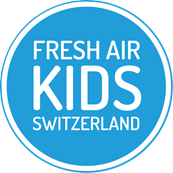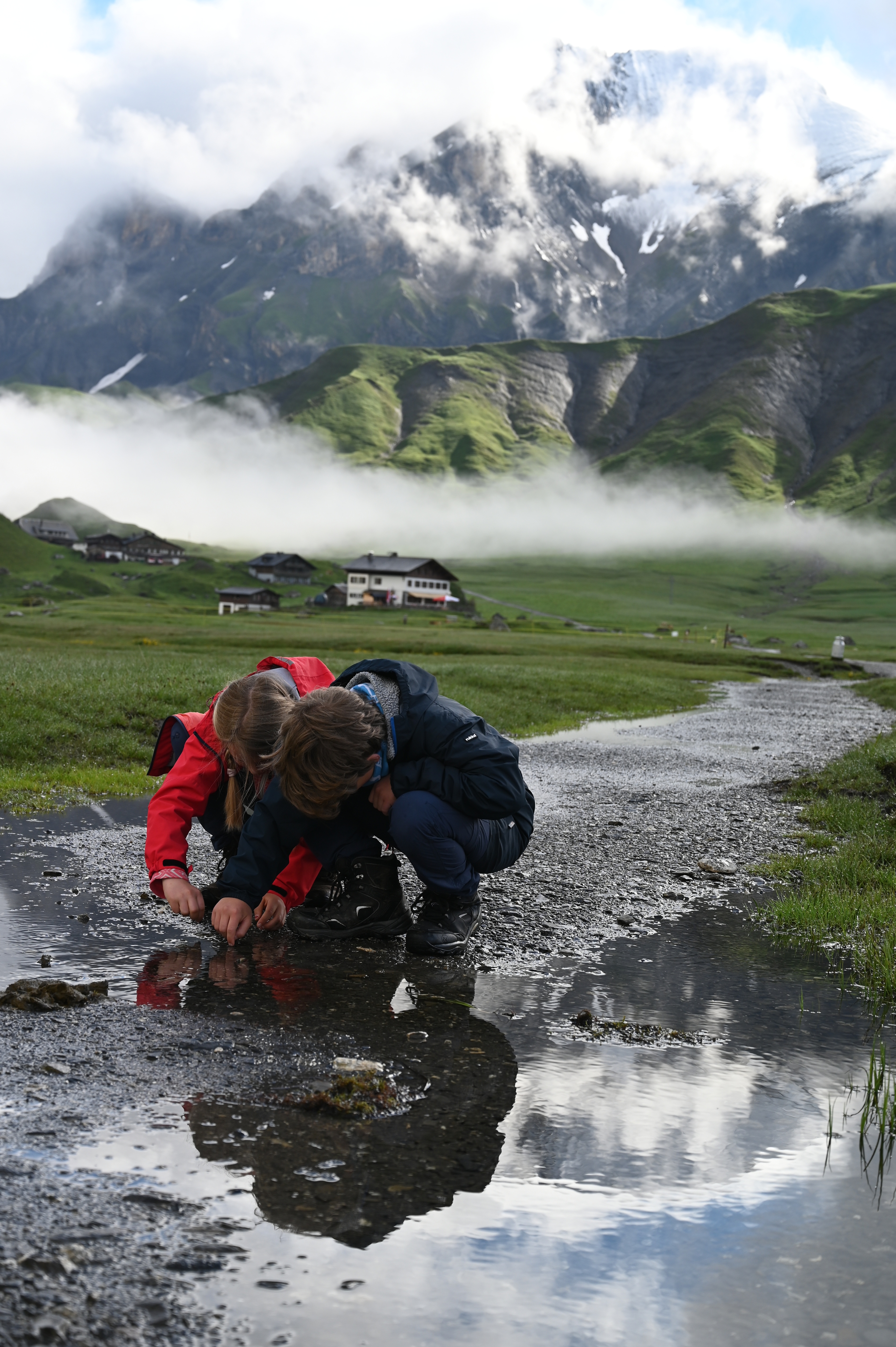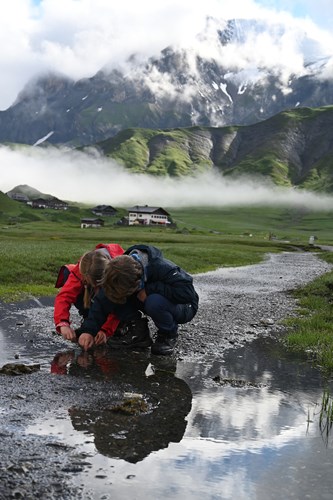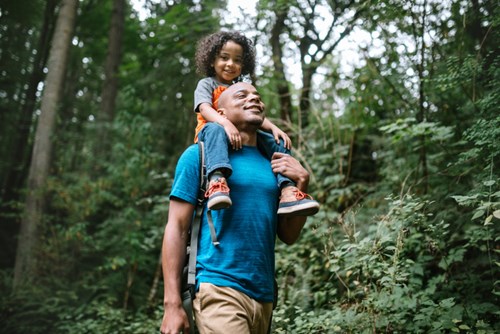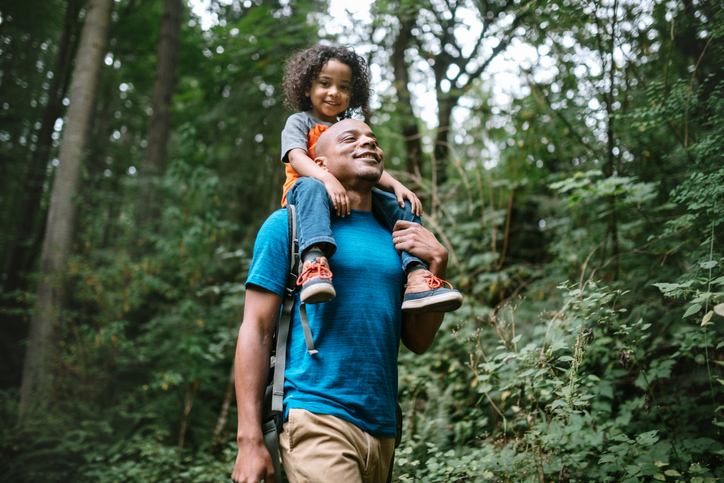Why Children Need Nature
by Melinda Taylor Schoutens, Fresh Air Kids Switzerland
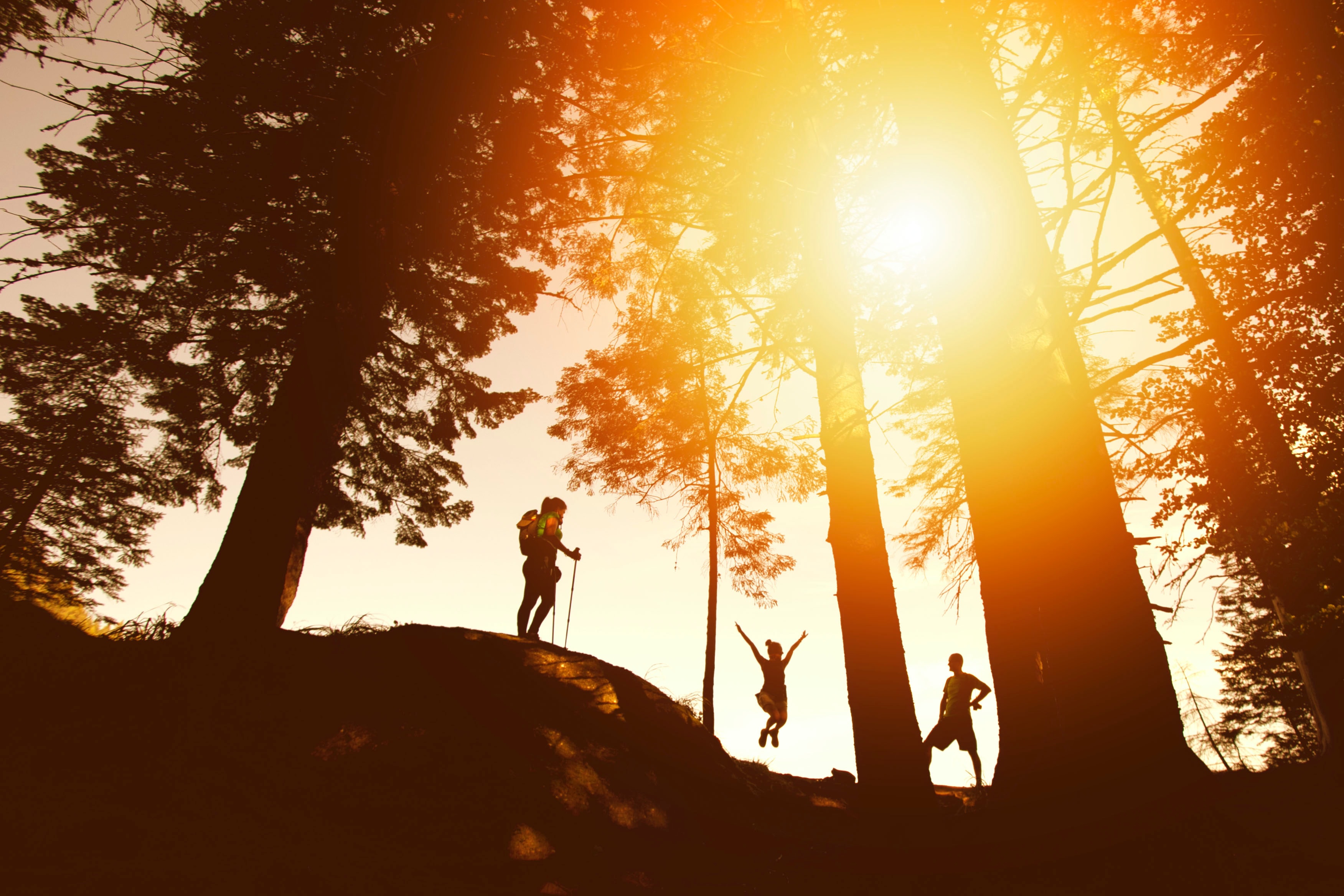

“Teaching children about the natural world should be seen as one of the most important events in their lives.”
- Thomas Berry - Cultural Historian and Geologian
As parents, we can easily be inundated with parenting books. Shelves of books offering advice and sage wisdom on how to be the ideal parent. I was never one to jump at the chance to read books about parenting, as all the information wrapped in those fancy texts left me feeling confused. Having that said, there was one book that left a lasting impression by transforming the way I viewed the natural world and my family’s place in nature. Without a doubt, the most influential book I have ever read, was Last Child in the Woods by Richard Louv. I do not recall what propelled me to pick up a copy of Last Child in the Woods, but that single decision has altered the way I parent and my desire to immerse my children in nature as frequently as possible.
Last Child in the Woods is comprised of almost 400 pages, with seven distinct chapters. Louv highlights the power of nature on the developing mind, how nature influences childhood creativity, why we as a collective have become more and more fearful of the natural world and action steps to help families spend more quality time outdoors. Louv’s book is a comprehensive guide to the importance of nature with a hopeful message.
My personal copy of the book has been highlighted and read over and over again with endless notes in the margins. That single book has been pulled from my shelf for over 11 years, used to reference, console and guide. Its author, Richard Louv, an American journalist, who has written a number of nature books, has become an expert in his field. Having coined the term, “nature - deficit disorder,” this non-medical term, refers to the idea that, “human beings, especially children, are spending less time outdoors, and the belief that this change results in a wide range of behavioral problems.” Louv goes on to attribute “nature deficit disorder” as, “a disorder that includes parental fears, restricted access to natural areas and the lure of electronic devices.”1
Recently, I had the opportunity to attend a virtual talk by Richard Louv. Much like the message delivered in his book, Last Child in the Woods, Louv emphasized the need for children to play freely outdoors. He encouraged parents to parent like a “humming bird.” Parents should learn to observe their child’s activities, but not hover. To look, but not interfere. As humming birds only swoop in when imminent danger is present, parents should do the same, allowing their children to explore freely without meddling.
Louv, is correct. As parents we must remember that children learn through discovery.
They make sense of the world around them by tinkering, exploring, and touching items in their environment. They are small scientists, observing, collecting data and weighing the outcomes. When in nature, children have active senses, which come alive through the sounds they hear, the sights they observe, the touch of a smooth stone, the smell of a flower, or the taste of a blueberry.
By engaging in exploratory play, children learn to take calculated risks, use fine and gross motor skills and trust their instincts.
Nature is a fundamental teacher that instills confidence and builds strength in our children. By providing our children with the freedom to investigate their surroundings, the education they receive on so many levels is priceless.
When many of us look back on our own childhoods we cannot help but become nostalgic for simpler times. I urge parents to take a moment to think about how their days were spent in their youth. My days, roaming freely through the neighborhood and playing with friends, would now be coined as “free range” parenting. My parents never hovered, nor monitored our play. Days stretched on forever as we searched for frog and lizards under a hot, summer sun. We retreated indoors only to fill water bottles or to eat a meal, running right back outside with mouths full of lunch. My childhood was a magical time and thus, my aim was to recreate that magic for my own children.
During Louv’s talk, I posed the question, “Do you find “nature - deficit disorder” something that primarily impacts America or is this a disorder that influences the greater world?”
Louv quickly explained that in his years of travel and research, “nature - deficit disorder” has become prominent on a global scale.
From China to Holland, he has witnessed nature becoming less of an integral aspect in the lives of children and more of an occasional luxury reserved for holidays. No wonder his books have been translated into more than 20 languages.
With the words of Louv’s book resonating in my mind, making nature a priority in the lives of our children, has truly molded our family life. We committed to exploring on a weekly basis from the time both of my children were in the womb, once they were born and throughout their childhoods. Our time spent hiking on local or alpine trails, has propelled us to write books, give talks and now, to become stewards of the planet.
Our time in nature has changed over the years. From carrying babies in backpacks, to pushing strollers, to taking shorter hikes that tiny legs can manage; our family’s outdoor time has grown, much the same as we have. Now that our children are older and far more capable of covering longer distances on more challenging trails, we enjoy hikes that take us to more remote locations. As we grow together as a family in the natural world, one thing remains constant; the time we spend in nature has always been invaluable.
Over the course of my mothering journey, I have keenly observed the impact nature has had on my children. I list those observations below.
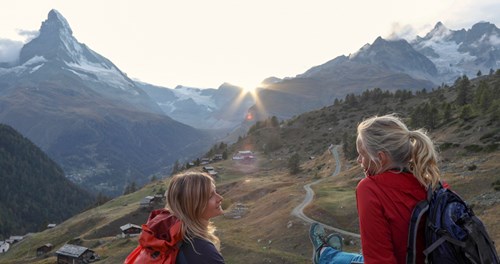
Nature Calms
Once my children return home after nature exploration, they are often relaxed and calm. Unlike when they are in the home and boredom ensues, nature is full of activities and excitement. When outside, they are physically active. That level of activity, sunlight exposure and physical exertion leaves them tranquil and centered. Louv highlights, as do many studies, that nature exposure helps those who suffer from attention deficit disorder (ADD) and leaves them focused hours after their immersion. (Louv, 2005, p. 100-104).
Enhances Curiosity
When in nature, my children are innately curious. They ask thought provoking questions, as they work hard to make sense of the world that surrounds them. They wonder about life cycles, seasons, and now that they are older, they question climate change and construct ways in which to help capitalize on nature’s resources to help power our cars by the sun. Curiosity, in my humble opinion is the foundation of intellect and nature is the ideal platform to spark that curiosity.
Knowledge Acquisition
Unlike school that teaches a standard curriculum, nature is flexible in its approach to learning. Children learn what they come in contact with. When they are unable to answer a question themselves, they ask others or they simply stop and discern. They may learn about crystals, wondering how those shiny, miraculous stones were formed. Children may wonder what labor and supplies were required to place a mountain hut high on a hill without the use of vehicles and machinery. They may inquire about the setting sun and the night sky, prompting research and reading. The opportunity to learn in nature is endless.
Learning to Empathize
Children learn empathy in nature. Our children have come to realize that the life cycles of some creatures, such as butterflies, are extremely short. They take in their fleeting beauty and appreciate their short flight. They understand that though tadpoles may be abundant in alpine ponds, only a few lucky ones will see their life cycle through to become adult frogs. For all the cows that cross our paths, our children know that cows are used for milk and meat, and thus, we pay reverence to the work they do and the food they provide. That knowing has propelled our son to become a vegetarian. Empathy is a characteristic that is practiced throughout every aspect of their lives and we are grateful for the teaching moments nature has provided to instill that into both of our children.
Perseverance
Finally, through hiking, our children have come to fully understand what it means to persevere. Together, we have hiked through snow, wind, rain, and sweltering heat. We have taken wrong turns, run out of water and spent far more time on the trail than we had planned. Through those difficult times we have collectively learned to push on and to rely on one another for support. My children have come to fully understand that difficult moments eventually pass.
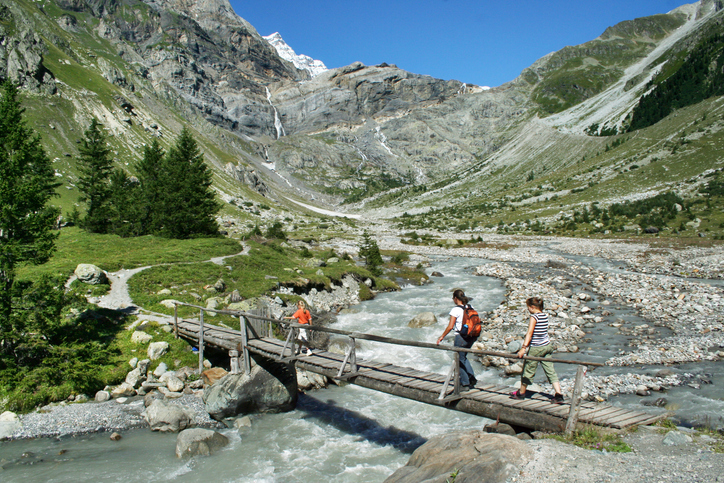
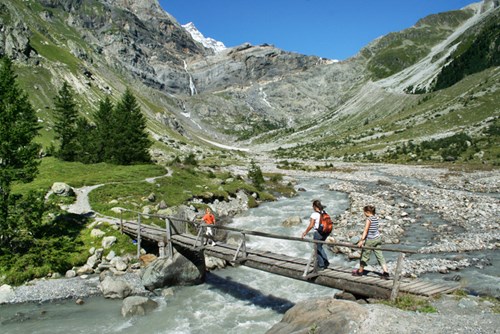
One of the greatest and most treasured joys gained from the time we spend outside, is the power to connect with my children on a deep and meaningful level. Whenever we are on the trail, void of our daily distractions, we have the opportunity to engage in quality conversations. Questions arise and heartfelt talks transpire. I can honestly say, some of my most memorable parenting moments have been when we were hiking.
Last Child in the Woods, is one book, with a powerful message, that had the ability to transform and enhance my family’s life. The question is now, what book has inspired positive change or enhanced your parenting journey in a meaningful way? In closing, as William Woodsworth, the English poet so famously said, “Let nature be your teacher.”
Footnotes
1 - Nature deficit disorder. (2021, 18, July). In Wikipedia
https://en.wikipedia.org/wiki/Nature_deficit_disorder
If you are interested in purchasing a copy of Richard Louv’s book, Last Child in the Woods, or any of his other books, please visit: www.bookdepository.com.
*I personally have no affiliation with the author, though I am grateful for his research and the work I know it took to place his words into the world for others to benefit from. I am forever indebted.
About the Author
Melinda Taylor Schoutens is a mother, wife, educator and author. Born and raised in the United States, she moved with her husband to Switzerland in 2007. Their initial contract of two - years quickly morphed into 14. Learning to be flexible and open to new possibilities has taught her a great deal. Now, as the mother of two children, Basel feels very much like home.
Melinda has a Master’s Degree in Curriculum and Instruction and has taught adults and children on an array of topics. She has designed educational curriculum for years and has curated and delivered a lecture entitled, “The Education of Nature.” She sits on the Board of Directors for HSK English Basel and is the author of the Fresh Air Kids Switzerland book series, which you can oder here.
To contact or to work with Melinda, please send an email to: melschoutens@gmail.com
Related Articles
Tips for an Overnight Stay in Mountain Huts in Switzerland
Choosing the right hiking boots
10 Reasons to Go Hiking with Your Kids
Camping with Kids
Sign up here to hear more from us!
Read more from our list of topics about how to have fun with kids

